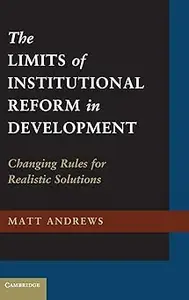
Free Download Matt Andrews, "The Limits of Institutional Reform in Development: Changing Rules for Realistic Solutions"
English | ISBN: 1107016339 | 2013 | 268 pages | AZW3 | 2 MB
Institutional reforms are common across the globe. Think of efforts to build new governments in Afghanistan and Iraq; or decades worth of interventions intended to improve fiscal management, reduce corruption or introduce efficient public sector service delivery in African countries.
These reforms often have limited results, however. They lead to new laws that are not properly implemented, and new organizations that have poor capacities and fail to function as needed. In this book, Matt Andrews explains why reform results are frequently limited and suggests ways to overcome these limits.
In the first half of the book, Andrews argues that reforms fail to make governments better when they are introduced as signals to gain short-term support-from donors and others. Reforms as signals introduce unrealistic best practices that do not fit developing country contexts and are not considered relevant by implementing agents. The result is a set of new forms that do not function properly. Andrews uses examples to prove this point, ranging from efforts to introduce fiscal rules in Argentina to reforms aimed at international accounting standard adoption in many African countries, and anti corruption interventions in Malawi and Uganda. In the second half of the book, Andrews notes that there are instances where reforms are not being introduced as signals, and are having more of an impact on government effectiveness. Examples include local government reforms in Rwanda, anti corruption initiatives in Indonesia, and a variety of initiatives ranging from results based management to civil service modernization and internal control regime adoption in governments like Kenya, Kosovo and Afghanistan. Andrews uses these examples to discuss ways in which reforms can actually provide realistic solutions to governance challenges in developing countries. Lessons from these experiences suggest that reform limits can be overcome by focusing interventions on problem solving, and promoting incremental and localized processes to find solutions, involving multiple agents who can authorize and implement reforms.
Read more
